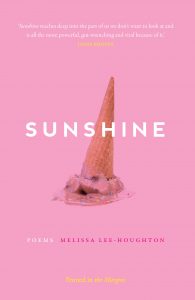Sunshine (Shortlisted, 2016 Costa Poetry Award)
 “This book is gonna be a killer. It’s gonna suck me dry, / suck me white, suck my insides out and leave me hollow and high.”
“This book is gonna be a killer. It’s gonna suck me dry, / suck me white, suck my insides out and leave me hollow and high.”
(“And All the Things That We Could Do I Face Today”)
A standard literary trope is to create expectations and defy them. So, to a seasoned reader, a collection entitled Sunshine, in a slim cotton-candy-pink book with an upturned ice-cream cone on the cover, immediately implies that all will not be, ahem, sunny within. It surpasses even my grimmest expectations.
A confessional writer, in the style of Sylvia Plath, Anne Sexton and Sarah Kane (that last is quoted in the foreword), Lee-Houghton’s poems brood introspectively on pain, death, sex, self-immolation, and the sheer poverty – moral and material – of the modern world. She pays diligent attention to her own body and that of her lovers, unafraid to limn their functions and their fluids in unsparing detail.
The first poem’s first four words are “If Disney made porn” – a startling juxtaposition that captures the attention immediately. Pieces possess a common theme of taking something beautiful and finding the horror and despondency within; the scene opens innocuously, and grisly layers unveil one at a time until the final line guillotines. For one instance, “Letter to Dr Ali Concerning Our Suicide Pact” opens “The fickle nurses sent for me, / told me to knock quietly on your office door” and concludes “I will drag you by the bottom lip / and be your little Lucifer forever.” Sometimes there are moments of what might be called conventional poetic beauty (“I fit inside love like the breath in a flute”), but beauty is not Lee-Houghton’s aim. There are no happy endings.
The collection leaps and jerks across forms. Some employ sharp, spaced-out couplets in the vein of Plath; the American’s influence is made obvious in “Mad Girl in Love”, a title directly reflecting the famed “Mad Girl’s Love Song”. Others trail down the page in verses dozens of lines long, wrought with insets and enjambment, while others still are laid out as prose but thick with metaphor and poetic elevation. The length varies too – some can be digested in a few minutes, whereas others march over several pages, approaching the sensation of a frenzied short story.
There is a lot of sex, even for confessional poetry norms. Few pages go by without a mention of her “pussy” (“kempt and cute”); blood “floods the veins around my clitoris”; lust is “flowing to my knickers and when I’m really wet / I’m so wet”. The constant references to her turned-on-ness mean you quickly stop being surprised, but that’s probably the point – Lee-Houghton normalises female sexuality (in “Z” she advises “I write like I masturbate”). Not all of the poems focus on unfulfilled desires vis-a-vis bodily functions – one decrying poverty is snappily titled “He Cried Out To the God of Austerities Who Said On The Seventh Day You Shall Tax, Pillage and Burn”, though this still finds itself exclaiming “the political climate comes in me like a hard cock”.
In reviewing this I’ve agonised over whether there is something I’m missing in the long-form poetic style. I certainly appreciate the craft behind Sunshine, and in some instances I was engaged, but more often not. The potency of the poems is diluted through their meandering and repetition – what is said could be said in a tenth of the space with ten times the impact. It feels like an unedited stream-of-consciousness that sometimes impresses but too often retreads, and frequently gives an impression of being a first draft (indeed, one piece includes the line “This is no longer the poem I expected”). However, I suspect many others will enjoy the improv-like flow more, and I will give it this – “the Valhalla of my vagina” is the most eyebrow-rocketingly magnificent phrase I’ve read in at least a month.
Adam Learmonth

Leave a Reply